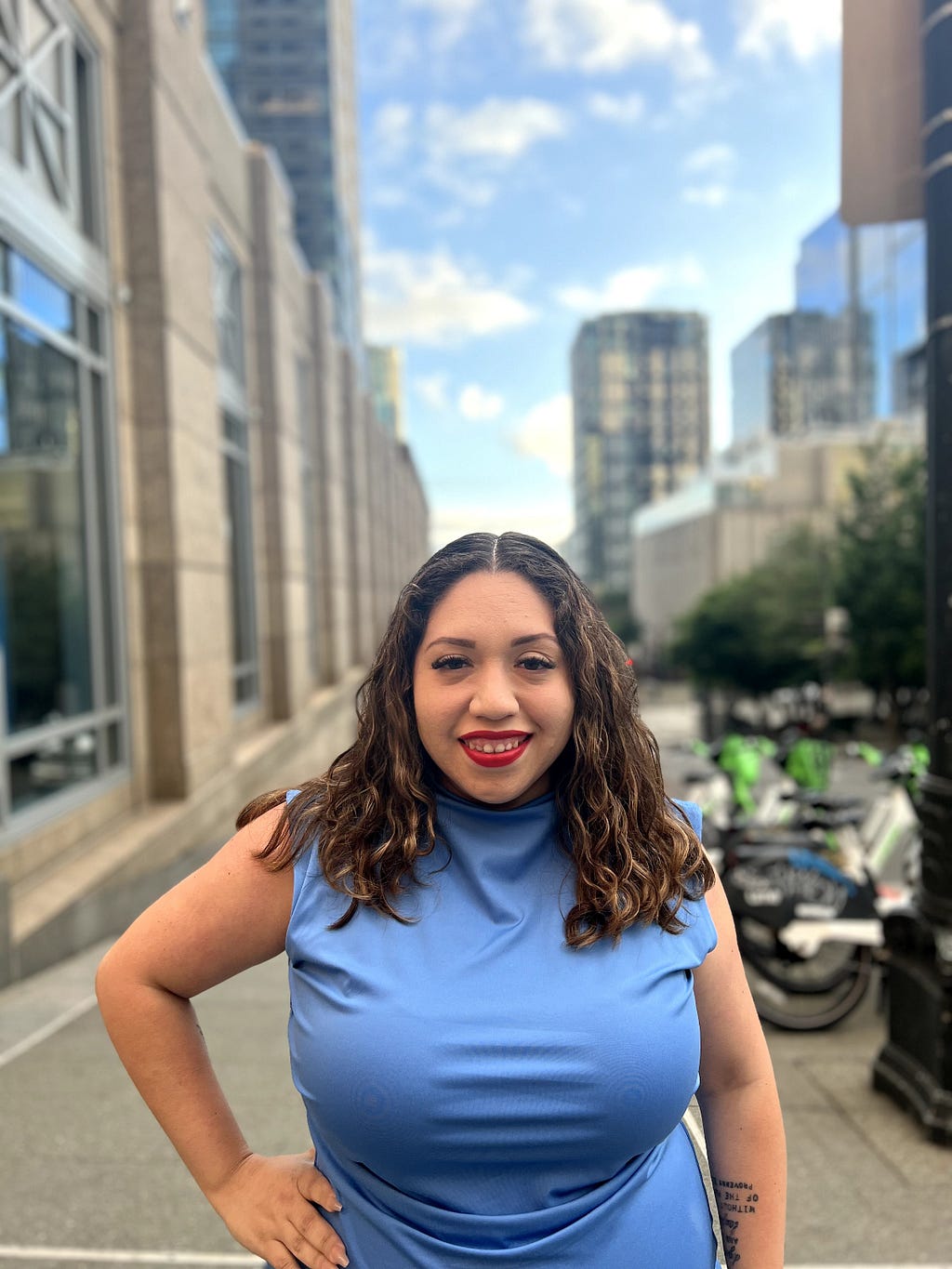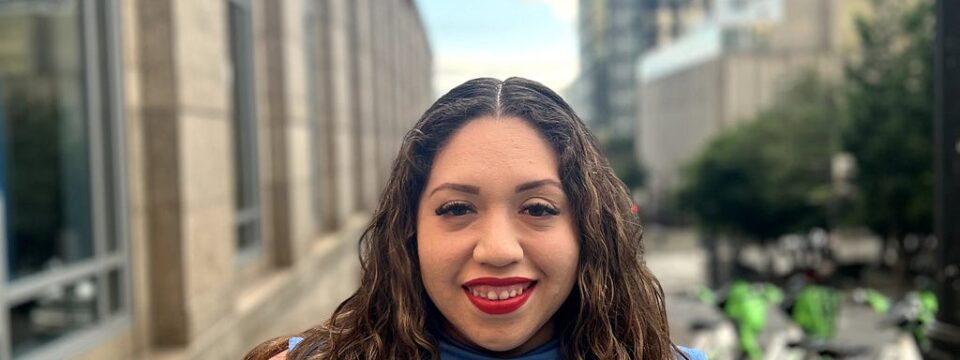Social Impact Heroes: Why & How Abigail O’Neal of Why Not You Academy Is Helping To Change Our World

Take care of yourself. — As a leader, you can be so focused on what everyone else needs — and your needs become last. If you don’t take care of yourself, you won’t be well-equipped to take care of others.
As part of my series about “individuals and organizations making an important social impact”, I had the pleasure of interviewing Abigail O’Neal.
An accomplished and experienced leader in the field of education with a strong commitment to social justice and equity, Abigail O’Neal is the Chief Executive Officer of Why Not You Academy, a charter public high school serving more than 150 students in Des Moines, Washington. With a notable career spanning over 10 years, Abi has demonstrated exceptional leadership skills and a track record of success in charter schools across New York, North Carolina, and California. Prior to working directly in Education, Abi O’Neal worked with Governor of Virginia, Terry McAuliffe, New York State Senator, Kirsten Gillibrand, and former Mayor of Los Angeles, Antonio Villaraigosa.
Thank you so much for joining us in this interview series! Can you tell us a story about what brought you to this specific career path?
Growing up, I learned the value of education at a small public magnet school in East LA, which showed me the benefits of small schools within the public system. That love for school led me to become the first in my family to go to college and get a college degree. At Syracuse University, I felt lonely and out of place, and realized quickly that students who looked and sounded like me don’t have access to higher education as much as we should. I decided to study education policy so I could help fight to make sure BIPOC students and students of the global majority can both have the opportunity to go to college and be successful there. I’ve been working in schools ever since then, and have fallen in love with supporting students so they can dream big and do what they want to do.
Can you share the most interesting story that happened to you since you began leading your company or organization?
I was a very good student — I got straight As, I had multiple awards, and was selected to speak at ceremonies — but my mom was not engaged at all. She didn’t understand what it all meant because she spoke Spanish.
It’s interesting to compare that to WNYA, where our students speak over 17 languages. At every parent meeting, we have interpreters to translate to Spanish, Somali, and ASL. It’s important that language isn’t a barrier to creating a community, so language accessibility is very important to us.
It has been said that our mistakes can be our greatest teachers. Can you share a story about the funniest mistake you made when you were first starting? Can you tell us what lesson you learned from that?
Anyone who works with young people can tell you that we make mistakes all the time and that we learn to laugh at them while we learn from them. It’s something you need to be able to do if you’re going to sustain yourself in work as important as this, and something we teach young people to do as well.
Can you describe how you or your organization is making a significant social impact?
WNYA is located in Des Moines, Washington, and our students come from fifty different middle schools. Our priority is making sure that our school is a safe space for our students, especially those who come to us having a negative relationship with school. Our smaller school size gives our students more intentional interaction not only with teachers but also with other students of different backgrounds and cultures, which has re-engaged them and allowed them to be successful in school.
Can you tell us a story about a particular individual who was impacted or helped by your cause?
Our school works with students to help identify their interests, which is especially important for those who come to us with no desire to participate in school. One student who was struggling behaviorally prior to WNYA not only has never been involved in a behavior issue since coming to our school, but is also now competing and winning in regional competitions and has a 4.0 GPA in community college as a junior.
Are there three things the community/society/politicians can do to help you address the root of the problem you are trying to solve?
- Creating more community spaces that are actually safe for our students to help keep them out of violence.
- For adults, being willing to speak with and serve as a mentor to students, especially those who are minorities, so they can be inspired by people who look like them.
- Equitable funding for charter public schools. One example of this is that even though the McKinney-Vento Act provides federal funding to states to serve homeless students, our school cannot access that funding for the 20% of our students who are experiencing homelessness. All public school students should receive equitable funding.
How do you define “Leadership”? Can you explain what you mean or give an example?
Leadership means service to the community. As a leader, you are serving others to represent them and help them when they need support.
My math teacher was a student of the revolutionary East LA teacher, Jaime Escalante. He taught disengaged students in my community that they could do math, that their ancestors have done math, and that we are great and meant to be great. Like Jaime, I want to be a leader who helps uplift communities and people who do have what it takes to be successful, but just haven’t been given the opportunities and chances that would allow them to be successful.

What are your “5 things I wish someone told me when I first started” and why. Please share a story or example for each.
1 . Take care of yourself.
As a leader, you can be so focused on what everyone else needs — and your needs become last. If you don’t take care of yourself, you won’t be well-equipped to take care of others.
2 . You will always make mistakes.
It’s okay if you mess up, but what matters is what you do after the mistake.
3 . Stop and listen.
You don’t always have to be in problem-solving mode, sometimes, all you have to do is listen.
4 . You will have to make tough decisions.
In the moment, a decision may seem hard, but remember what the long-term goal is. My goal is always to help the students.
5 . Share your success, but share your challenges, too.
While you should tout your wins and the hard work you have been doing, you should share what challenges you have been experiencing so you can get the support you need.
You are a person of enormous influence. If you could inspire a movement that would bring the most amount of good to the most amount of people, what would that be? You never know what your idea can trigger. 🙂
I believe the key to success is education, so I’d want to remove all of the barriers to education so that people can focus on learning. If our future generations all get the critical thinking skills they need, they can solve all of the world’s problems and bring good to everyone.
Can you please give us your favorite “Life Lesson Quote”? Can you share how that was relevant to you in your life?
“Sí se puede” means “Yes we can” in Spanish. It means that if you believe you can do something, you can. It is a constant reminder that our ancestors have overcome so much to get us to where we are today, so we have to believe that we can. I use it all the time — before a big board meeting and even when I feel I’m too tired to complete that last task of the day.
Is there a person in the world, or in the US with whom you would like to have a private breakfast or lunch with, and why? He or she might just see this, especially if we tag them. 🙂
Sonia Sotomayor — she embodies the “Sí se puede” mentality. Despite having her own loss of family and health issues that could have prevented her from achieving her wins, she is now the first Latina Supreme Court Justice.
How can our readers further follow your work online?
This was very meaningful, thank you so much. We wish you only continued success in your great work!
Social Impact Heroes: Why & How Abigail O’Neal of Why Not You Academy Is Helping To Change Our… was originally published in Authority Magazine on Medium, where people are continuing the conversation by highlighting and responding to this story.
